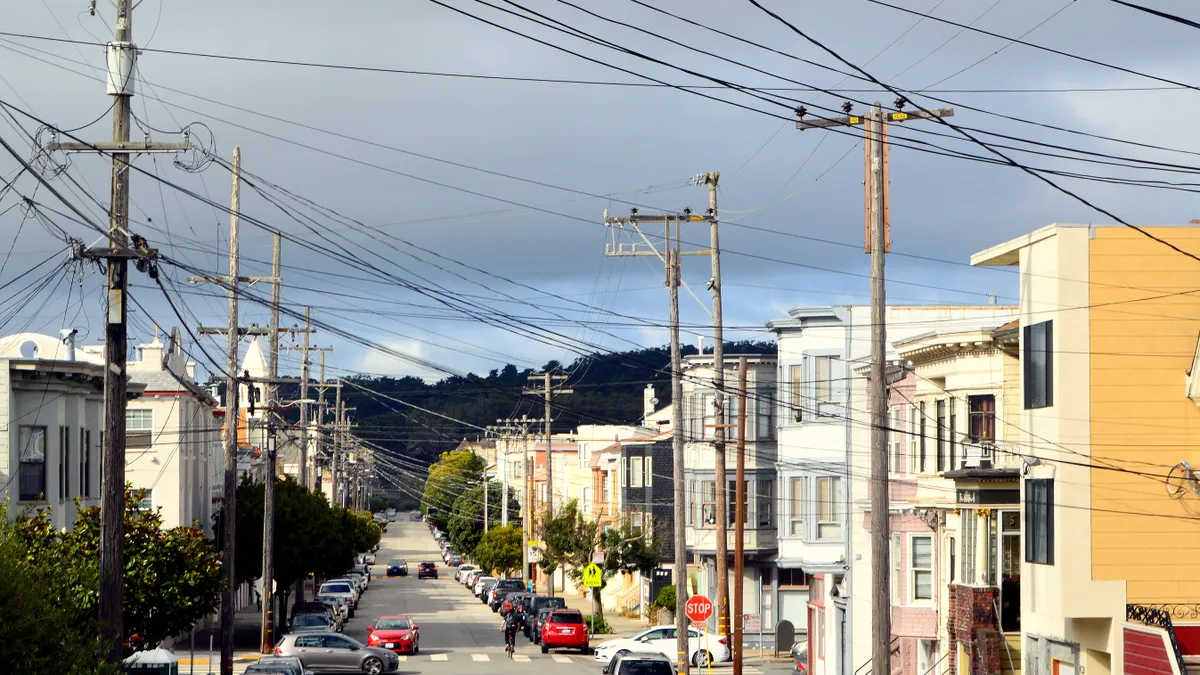Dive Brief:
- California will no longer allow new buildings that burn fossil fuels on-site to receive subsidies from utilities for electric line extensions, starting July 1, according to a Dec. 14 decision by the California Public Utilities Commission.
- “Ending indirect incentives for natural gas system expansion helps us align state climate goals with our subsidies and financial incentives,” CPUC Commissioner Darcie L. Houck said in a statement. The move will also save ratepayers money, she said.
- With this decision, California has ditched all utility subsidies for new construction that expands the gas system. In 2022, the CPUC had made California the first state to eliminate such subsidies for natural gas line extensions to new buildings that burn fossil fuels on-site.
Dive Insight:
California is working toward a 2030 goal of slashing its greenhouse gas emissions 40% below 1990 levels and becoming carbon neutral by 2045.
Investor-owned utilities in California have historically covered at least part of the cost of the expansion of gas pipelines or electric lines to new construction, explained Beckie Menten, senior regulatory and policy specialist at the Building Decarbonization Coalition, a national organization that aims to help communities eliminate fossil fuels in buildings.
This subsidy model hampers California’s efforts to encourage all-electric new construction, however, by rewarding builders who expand new gas lines, according to CPUC’s Dec. 14 decision.
CPUC’s decision to end electric line expansion subsidies for new buildings using gas drew strong support from the Southern California Edison Co. utility as well as the Sierra Club, California Environmental Justice Alliance and the Natural Resources Defense Council.
Two other utilities, Pacific Gas and Electric Co. and San Diego Gas and Electric Co., joined the California Building Industry Association in generally favoring the decision but recommending some modifications. For example, PG&E proposed eliminating electric line expansion subsidies for all new construction, regardless of whether it’s all-electric or mixed-fuel. CPUC held, however, that keeping the subsidies is important to promote all-electric new construction.
The decision faced opposition from the Coalition of California Utility Employees, which said that safety and reliability issues could result from fewer customers paying for gas infrastructure and argued that the state must address employment impacts on gas workers. Small Business Utility Advocates also opposed CPUC’s decision, citing cost concerns for small business owners.
CPUC said in its news release that it was giving the builder community adequate time to prepare for the change by setting the subsidy elimination to go into effect this summer. It also said in its decision that it is committed to helping small businesses address potential barriers to electrification. CPUC added in the decision that the subsidy elimination won’t threaten affordable housing and low-income customers; instead, it could protect vulnerable communities from future gas rate increases and potentially lower rents due to the lower cost of all-electric new construction compared with mixed-fuel construction.
The decision will also require California’s three largest electric investor-owned utilities to annually report electric line extension expenditures for all new construction, starting May 1. The reporting requirement aims to help CPUC track the savings associated with the elimination of electric line expansion subsidies for buildings using gas.
Plus, starting at the beginning of 2025, all new construction projects using gas must pay for the final actual costs of an electric line extension, rather than just the initial estimated costs.











